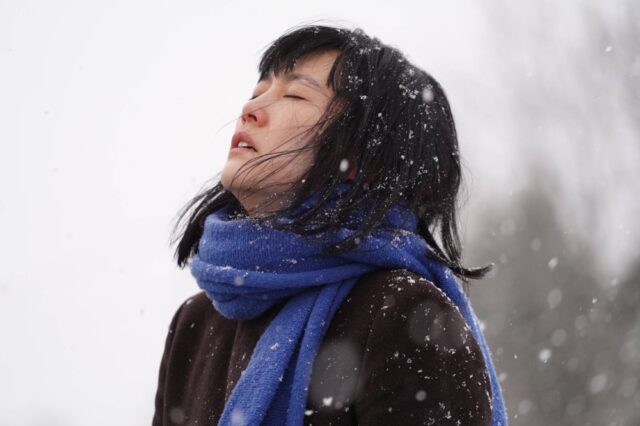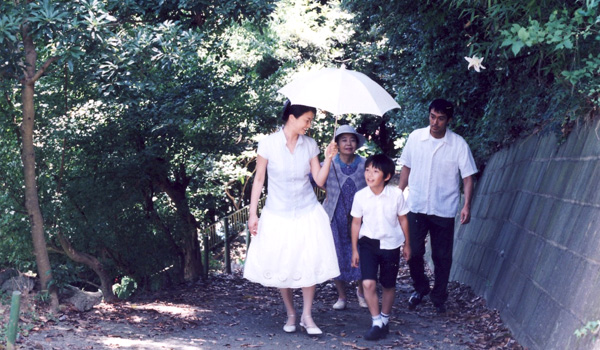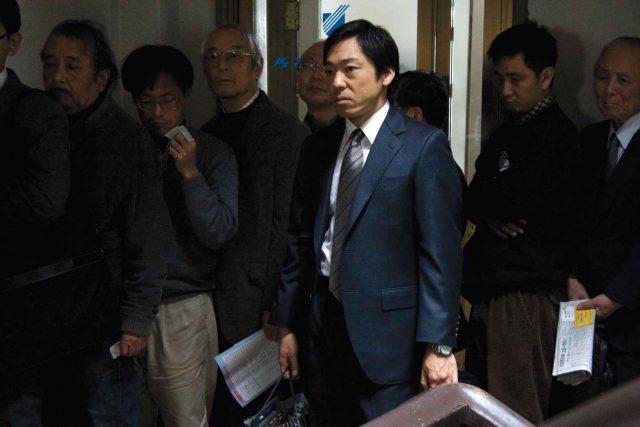
Yoko is making its US premiere at in Japan Society / IFC Center series
FAMILY PORTRAIT: JAPANESE FAMILY IN FLUX
Japan Society, 333 East 47th St. at First Ave.
IFC Center, 323 Sixth Ave. at West Third St.
February 15 – March 22
www.ifccenter.com
japansociety.org
In February 2021, as part of the ACA Cinema Project, Japan Society and Japan’s Agency for Cultural Affairs teamed up for “21st Century Japan: Films from 2001-2020,” a three-week virtual festival of Japanese films from the previous twenty years, followed in December by “Flash Forward: Debut Works and Recent Films by Notable Japanese Directors,” a three-week hybrid series pairing directors’ most recent works with their debuts. Since then, they have also presented “Emerging Japanese Films” and “The Female Gaze: Women Filmmakers from Japan Cuts and Beyond.”
The festival is now back with “Family Portrait: Japanese Family in Flux,” ten films that explore familial bonds. The selections range from Yasujirō Ozu’s 1967 Tokyo Twilight and Kohei Oguri’s 1981 Muddy River to the New York premiere of Ryota Nakano’s 2019 A Long Goodbye and the US premieres of Teruaki Shoji’s Hoyaman and Keiko Tsuruoka’s Tsugaru Lacquer Girl. Nakano will take part in a Q&A and reception following the February 23 New York premiere of Her Love Boils Bathwater, and he will be on hand for a discussion after the February 24 showing of his latest work, The Asadas, which was inspired by real-life photographer Masashi Asada.
All screenings take place at Japan Society except for the February 22 US premiere of Kazuyoshi Kumakiri’s Yoko, which will be shown at IFC Center; the film stars Pistol Takehara, Jun Fubuki, Oscar nominee Rinko Kikuchi, and TV, film, and music favorite Joe Odagiri.
“‘Family Portrait: Japanese Family in Flux’ is a richly thematic series celebrating the rise, fall, and rebirth of the Japanese family,” Japan Society director of film Peter Tatara said in a statement. “Showcasing films from across the past sixty-five years, audiences will find an ever-evolving image of what family means in Japan, and the universally human sorrow and joys at its core.”
Below are select reviews from the series.

Hirokazu Kore-eda’s Still Walking is a special film that honors such Japanese directors as Naruse, Ozu, and Imamura
STILL WALKING (ARUITEMO ARUITEMO) (Hirokazu Kore-eda, 2008)
Japan Society
Thursday, February 15, 7:00
japansociety.org
Flawlessly written, directed, and edited by Hirokazu Kore-eda (Shoplifters, After Life), Still Walking follows a day in the life of the Yokoyama family, which gathers together once a year to remember Junpei, the eldest son who died tragically. The story is told through the eyes of the middle child, Ryota (Hiroshi Abe), a forty-year-old painting restorer who has recently married Yukari (Yui Natsukawa), a widow with a young son (Shohei Tanaka). Ryota dreads returning home because his father, Kyohei (Yoshio Harada), and mother, Toshiko (Kirin Kiki), are disappointed in the choices he’s made, both personally and professionally, and never let him escape from Junpei’s ever-widening shadow. Also at the reunion is Ryota’s chatty sister, Chinami (You), who, with her husband and children, is planning on moving in with her parents in order to take care of them in their old age (and save money as well).
Over the course of twenty-four hours, the history of the dysfunctional family and the deep emotions hidden just below the surface slowly simmer but never boil, resulting in a gentle, bittersweet narrative that is often very funny and always subtly powerful. The film is beautifully shot by Yutaka Yamazaki, who keeps the camera static during long interior takes — it moves only once inside the house — using doorways, short halls, and windows to frame scenes with a slightly claustrophobic feel, evoking how trapped the characters are by the world the parents have created. The scenes in which Kyohei walks with his cane ever so slowly up and down the endless outside steps are simple but unforgettable. Influenced by such Japanese directors as Mikio Naruse, Yasujiro Ozu, and Shohei Imamura, Kore-eda was inspired to make the film shortly after the death of his parents; although it is fiction, roughly half of Toshiko’s dialogue is taken directly from his own mother. Still Walking is a special film, a visual and psychological marvel that should not be missed.

Ryuhei Sasaki (Teruyuki Kagawa) has trouble facing his sudden unemployment in Kiyoshi Kurosawa’s Tokyo Sonata
TOKYO SONATA (Kiyoshi Kurosawa, 2008)
Japan Society
Sunday, February 18, 7:00
japansociety.org
Winner of the Un Certain Regard Jury Prize at Cannes, Tokyo Sonata serves as a parable for modern-day Japan. Ryuhei Sasaki (Teruyuki Kagawa) is a simple family man, with a wife, Megumi (Kyōko Koizumi), two sons, Takashi (Yu Koyanagi) and Kenji (Kai Inowaki), and an honest job as an administration director for a major company. When Ryuhei is suddenly let go — he is being replaced by much cheaper Chinese labor — he is so ashamed, he doesn’t tell his family. Instead, he puts on his suit every day and, briefcase in hand, walks out the door, but instead of going to work, he first waits on line at the unemployment agency, then at an outdoor food kitchen for a free lunch with the homeless — and other businessmen in the same boat as he is. Taking out his anger on his family, Ryuhei refuses to allow Kenji to take piano lessons and protests strongly against Takashi’s desire to join the American military. But then, on one crazy night — which includes a shopping mall, a haphazard thief (Koji Yakusho), a convertible, and some unexpected violence — it all comes to a head, leading to a brilliant finale that makes you forget all of the uneven missteps in the middle of the film, which is warmly photographed by Akiko Ashizawa and about a half hour too long anyway.
Kagawa (Sukiyaki Western Django, Tokyo!) is outstanding as the sad-sack husband and father, matched note for note by the wonderful pop star Koizumi (Hanging Garden, Adrift in Tokyo), who searches for strength as everything around her is falling apart. And it’s always great to see Yakusho, the star of such films as Kurosawa’s Cure, Shohei Imamura’s The Eel, Rob Marshall’s Memoirs of a Geisha, and Alejandro González Iñárritu’s Babel, seen here as a wild-haired, wild-eyed wannabe burglar.
[Mark Rifkin is a Brooklyn-born, Manhattan-based writer and editor; you can follow him on Substack here.]